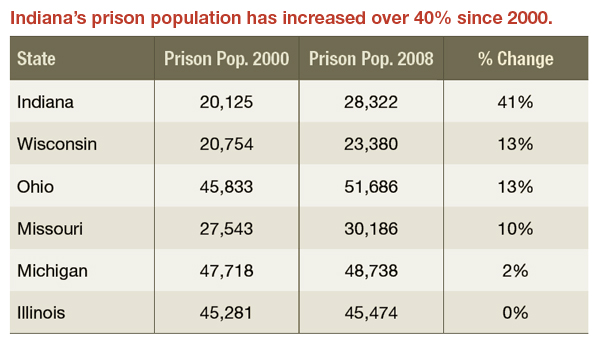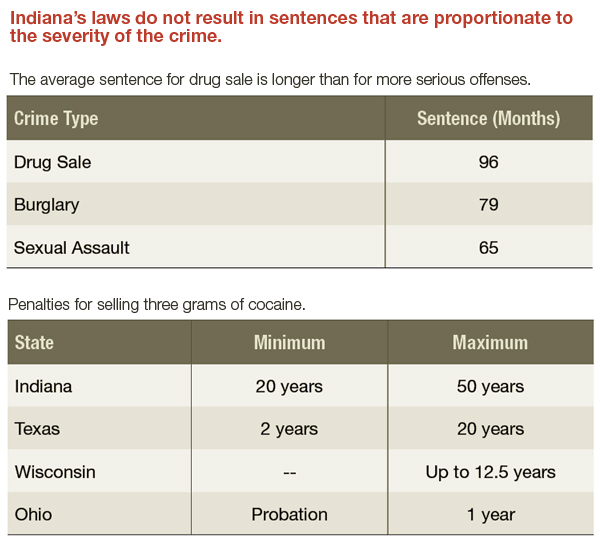A new approach to sentencing, community supervision, and public safety in Indiana
In 2010, Indiana became the 19th state to receive technical assistance from the Pew Center on the States’ Public Safety Performance Project. The Pew Center provided the technical assistance in partnership with the Council of State Governments Justice Center (CSG) to use a justice reinvestment approach in Indiana to reduce spending on corrections and reinvest savings in strategies to increase public safety.
CSG policy analysts met with stakeholders from all three branches of Indiana government and the Justice Reinvestment Steering Committee to collect and analyze data on crime, courts, corrections, and community supervision trends. Judicial Center Executive Director Jane Seigel, Judge John Surbeck of Allen Superior Court and Judge Wayne Trockman of Vanderburgh Superior Court represented the judicial branch on the steering committee. CSG presented its policy options to Indiana policymakers on the Criminal Code Evaluation Committee on December 16th. Chief Justice Randall Shepard, Judge John Marnocha of St. Joseph Superior Court and Judge Lance Hamner of Johnson Superior Court represent the judicial branch on the Criminal Code Evaluation Committee.

The first policy recommendation was in the area of sentencing. CSG’s research showed that Indiana’s sentencing policies result in disproportionate penalties for theft offenses, drug offenses and non-violent offenses. CSG recommended graduated penalties for theft and drug convictions, and increased judicial discretion for sentencing non-violent criminal offenders. “Shifting from a one-size-fits-all approach for drug and theft offenses to graduated penalties will bring Indiana in line with other states and ensure that an offender’s punishment fits the crime. Allowing more judicial discretion for non-violent offenders will result in sentences that have a better chance of reducing recidivism,” said Judge Marnocha.

The next policy recommendation was in the area of community supervision. CSG’s research showed that Indiana’s community supervision agencies are uncoordinated, overlapping and do not share information about individuals under supervision. CSG recommended strengthening community supervision by prioritizing resources for high-risk offenders, creating incentives for coordination among supervision agencies, creating a probation improvement fund and requiring probation supervision after release from prison for most offenders. “The recommendation to focus community supervision resources on high-risk offenders fits perfectly with Indiana’s risk assessment project and will allow probation officers and community corrections officers to provide more effective supervision to the offenders who pose the greatest likelihood of re-offending”, said Jane Seigel. “The use of competitive grants to support the adoption of best practices by probation departments and requiring a period of probation supervision for all but the most serious offenders released from prison will result in better supervision practices and reduce recidivism rates of felony offenders.”
The final policy recommendation was in the area of public safety. CSG’s research showed that community-based substance use treatment programs are not available to many offenders under supervision and responses to probation violations are slow and ineffective, making re-offense more likely. CSG recommended increasing the availability of addiction treatment in the community and enabling probation officers to exercise swift and certain sanctions for probation violations. “Research has consistently shown that programs that address an offender’s drug use result in reduced rates of recidivism and increased public safety,” said Judge Trockman. “Employing swift and certain sanctions for probation violations has already been proved effective in drug court and should help reduce revocations to prison in other probation cases.”
The next phases of the Justice Reinvestment Project will be enacting the new policy options, developing implementation plans and measuring the impact of the new policies on prison population and re-incarceration rates. Draft legislation based on the CSG policy recommendations has been introduced in the General Assembly for consideration during the 2011 legislative session. “This is an exciting time to make improvements in Indiana’s criminal justice system. The judicial branch looks forward to working with legislators and other policy makers to implement the policy recommendations proposed by CSG,” said Chief Justice Shepard. Judges who wish to learn more about the Justice Reinvestment Project can contact the Indiana Judicial Center for more information.